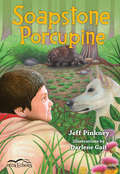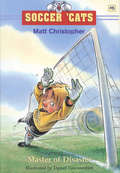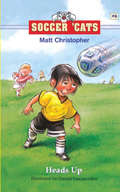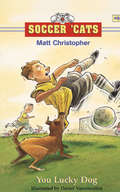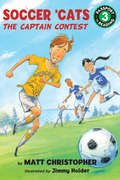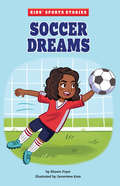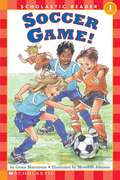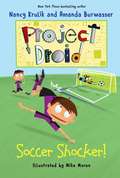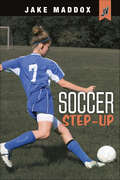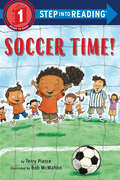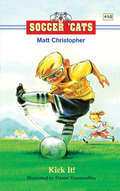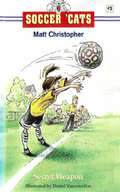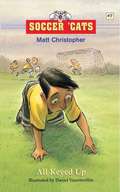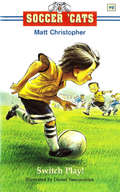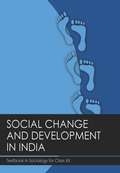- Table View
- List View
Soapstone Porcupine (Orca Echoes)
by Jeff PinkneyThe dog shows up the way snow does on a winter's day. She just drifts in and stays, becoming the friend of a young Cree boy. The boy and the dog set out on an adventure that ends in a quandary involving quills and a big brother who swears to take revenge on the porcupine. But Lindy, a Cree elder and master carver, reminds the brothers of the importance of the great porcupine. After a day spent carving in town, the boy learns some truths about human nature and realizes that sometimes, like the porcupine, you must put your quills up to keep from getting pushed around. Soapstone Porcupine is the second book, after Soapstone Signs, narrated by a young Cree boy. The epub edition of this title is fully accessible.
Sobrevivientes del Dust Bowl (¡Arriba la Lectura!, Level W #87)
by Patti TrimbleNIMAC-sourced textbook. El Dust Bowl barrió las Grandes Llanuras en la década de 1930. En esa época, las cosechas se perdieron, se murió el ganado y los agricultores y empresarios cayeron en bancarrota. En este libro aprenderás lo difícil que fue ese período, según lo contaron sus sobrevivientes.
Soccer 'Cats #5: Master of Disaster
by Matt Christopher Daniel VasconcellosAlthough he's better known for his wisecracks than his goal keeping abilities, Jason Shearer is taking the place of the Soccer 'Cats' goalie, who's going on vacation. Will Jason learn what he needs to know before the game against the always-tough Panthers?
Soccer 'Cats #6: Heads Up!
by Matthew F ChristopherAmanda Caler thought getting a nosebleed during a game was bad, but now things have gone from bad to worse--she finds she's afraid of the ball now! And if that's not bad enough, it looks like someone is trying to steal her spot at halfback. Could one of her teammates be capable of such a thing? Illustrations.
Soccer 'Cats #8: You Lucky Dog (Soccer Cats)
by Stephanie Peters Matthew F Christopher Daniel VasconcellosLou Barnes puts himself offside during soccer games and that can cost the team a chance at a goal. Then one game a dog runs on to the pitch and reminds him of his position and the offside rule. But who taught a dog how to play soccer and why?
Soccer 'Cats: The Captain Contest
by Matt Christopher Jimmy Holder Matt HoobanIt's time to sign up for soccer league! Best buddies Dewey London and Bundy Neel are psyched about the new team, until they learn about the contest to be captain: Whomever draws the best team logo will be named captain. Should artistic Dewey enter even though he knows in his heart that Bundy would make a better captain?Passport to Reading Level 3
Soccer (Houghton Mifflin Vocabulary Reader Accompanies Journeys)
by Sandra FernandezNIMAC-sourced textbook <P><P>Level G DRA 12 social Studies Strategy-Summarize <P><P>Lexile: 510L
Soccer (Magic Tree House #29)
by Mary Pope Osborne Sal Murdocca Natalie Pope BoyceWhen Jack and Annie got back from their adventure in Magic Tree House #52: Soccer on Sunday, they had lots of questions. How did soccer get started? Who are some of its greatest players? What is the World Cup? Find out the answers to these questions and more as Jack and Annie track the facts behind one of the world's most popular sports. Filled with up-to-date information, photos, illustrations, and fun tidbits from Jack and Annie, the Magic Tree House Fact Trackers are the perfect way for kids to find out more about the topics they discovered in their favorite Magic Tree House adventures.
Soccer Dreams (Kids' Sports Stories)
by Shawn PryorWanting to be a striker like her grandpa was, Keisha jumps into soccer practice with both feet and, unfortunately, both hands. She's afraid her habit of catching the ball will end her sports dream, but Coach has a new game plan.
Soccer Game (Hello Reader / Je Peux Lire Ser.)
by Grace MaccaroneThis lively, rhyming Hello Reader! story comes out just in time for the 1994 World Cup Soccer Championship being played in the U.S. Young readers will delight in the easy-to-read format that takes them through the ups, downs, and fun of a soccer game. A Level 1 Hello Reader! for beginning readers. Full-color illustrations.
Soccer Shocker!: Project Droid #2 (Project Droid)
by Nancy Krulik Amanda Burwasser Mike MoranWhen Mom tells Logan that Java is joining his soccer team, the Purple Wombats, he’s not thrilled. It’s a lot of work teaching his new robot cousin how to act like a human-and keeping him out of trouble-and Logan needs a break.Still, being programmed for success means that Java’s also great at scoring. He might just turn the Wombats into a championship team, beating Sherry and Jerry Silverspoon and their Red Polar Bears . . . if he’d just let the other kids play, too. After being replaced as the Wombats’ MVP, Logan’s had enough.But when Java gets wet and goes on the fritz, can the whole team-even a short-circuiting Java-come together to score the winning goal?The second in a fantastically funny new chapter book series by internationally bestselling author Nancy Krulik and her daughter, Amanda Burwasser, Soccer Shocker is destined to win tons of fans.Sky Pony Press, with our Good Books, Racehorse and Arcade imprints, is proud to publish a broad range of books for young readers-picture books for small children, chapter books, books for middle grade readers, and novels for young adults. Our list includes bestsellers for children who love to play Minecraft; stories told with LEGO bricks; books that teach lessons about tolerance, patience, and the environment, and much more. While not every title we publish becomes a New York Times bestseller or a national bestseller, we are committed to books on subjects that are sometimes overlooked and to authors whose work might not otherwise find a home.
Soccer Step-Up (Jake Maddox JV)
by Jake MaddoxHotshot forward Melina Stern is ready to start her last season of middle school soccer. But there's a problem. There won't be a middle school team this year! The program has been cut due to budget constraints, and the girls are forced to try out for the high school JV team. At first Melina is secretly excited for the tougher gameplay, but when the older girls begin teasing her relentlessly, she struggles to hold her own on the field. Now Melina is doubting her skills and her love for soccer. Can Melina perform like the talented striker she is, and can the girls ever play like a true team? A glossary, writing prompts, discussion questions, and bonus soccer facts make this action-packed sports story as engaging and educational as it is exciting.
Soccer Time! (Step into Reading)
by Terry PierceGOOOOOOOOAL!! This Step 1 introduction to practically every child's first team sport is a win for emergent readers.No hands--just feet. The game starts. Tweet! Young soccer enthusiasts will build their reading confidence as they learn about basic skills and the thrill of scoring a goal in Terry Pierce's rhythmic, rhyming Step 1 Reader. As she did in Jack and Jill and T-Ball Bill and Tae Kwon Do!, Pierce captures the excitement of sports while scaffolding reading with alliteration and word families. Step 1 Readers feature big type and easy words for children who know the alphabet and are eager to begin reading. Rhyme and rhythmic text paired with picture clues help children decode the story.
Soccer ’Cats #10: Kick It! (Soccer Cats)
by Stephanie Peters Matthew F Christopher Daniel VasconcellosAfter Alan accidentally kicks his teammate Eddie during a game, he not only has problems kicking but also has to endure teasing by another fullback.
Soccer ’Cats #1: The Captain Contest (Matt Christopher Sports Readers #Vol. 1)
by Stephanie Peters Matthew F Christopher Daniel VasconcellosDewey London and Bundy Neel are psyched about the new summer soccer league, until they learn about the contest to be team captain: Whoever draws the best team logo will be named captain. Should artistic Dewey enter even though Bundy would make a better captain?
Soccer ’Cats #2: Operation Baby-Sitter (Soccer Cats)
by Matthew F ChristopherBundy works hard at being the best soccer player he can be. He always encourages his teammates, and works extra hard during practice. So when his attitude changes, little does his teammates know that he's been saddled with a baby-sitter. Illustrations.
Soccer ’Cats #3: Secret Weapon (Soccer Cats)
by Matthew F ChristopherLisa Gaddy is a starting fullback for the 'Cats and she plays her position well -- except for one thing. She's small for her age, so her throw-ins from the sidelines don't go very far. Sometimes the ball winds up landing in front of an opponent instead of a teammate. She can't stop taking throw-ins (though one of her teammates thinks she should), but unless she grows three inches before the season ends, there doesn't seem to be any way she can improve. Or is there? The coach has an idea to turn Lisa's throw-ins into the 'Cats' secret weapon. . . .
Soccer ’Cats #7: All Keyed Up
by Stephanie Peters Matthew F Christopher Daniel VasconcellosStookie Norris has asked Jerry Dinh to care for his gerbils whilst he's away on holiday. Jerry is so pleased as he has wanted to get to know Stookie better since they became neighbours. Then something terrible happens that threatens to ruin his hopes. Will Stookie ever forgive him?
Soccer ’Cats #9: Switch Play! (Soccer Cats)
by Stephanie Peters Matthew F Christopher Daniel VasconcellosWhen Ted's twin sister Lisa, a fullback on the 'Cats soccer team, gets attention for her special move on the field, Ted determines to come up with an outstanding play also.
Soccer: Soccer on Sunday
by Mary Pope Osborne Sal Murdocca Natalie Pope BoyceThe #1 bestselling chapter book series of all time celebrates 25 years with new covers and a new, easy-to-use numbering system! Getting the facts behind the fiction has never looked better. Track the facts with Jack and Annie!! When Jack and Annie got back from their adventure in Magic Tree House Merlin Mission #24: Soccer on Sunday, they had lots of questions. How did soccer get started? Who are some of its greatest players? What is the World Cup? Find out the answers to these questions and more as Jack and Annie track the facts behind one of the world's most popular sports. Filled with up-to-date information, photos, illustrations, and fun tidbits from Jack and Annie, the Magic Tree House Fact Trackers are the perfect way for kids to find out more about the topics they discovered in their favorite Magic Tree House adventures. And teachers can use Fact Trackers alongside their Magic Tree House fiction companions to meet common core text pairing needs. Did you know that there’s a Magic Tree House book for every kid? Magic Tree House: Adventures with Jack and Annie, perfect for readers who are just beginning chapter books Merlin Missions: More challenging adventures for the experienced reader Super Edition: A longer and more dangerous adventure Fact Trackers: Nonfiction companions to your favorite Magic Tree House adventures Have more fun with Jack and Annie at MagicTreeHouse.com!
Social And Political Life - 3 class 8 - JK Board
by Jammu and Kashmir Board Of School EducationThis textbook will be a boon for students who are to appear for their final examination of class 8. Created on close par with the NCERT syllabus, the textbook helps the students to learn the Indian constitution in all its depth and glory. It includes content that has been written using simple English, which is easy to follow and understand. The textbook contains an interactive flow of words that will keep the students hooked on to the different chapters, which explain different socio-political aspects of the society.
Social Change and Development in India (Sociology) class 12 - Meghalaya Board
by Meghalaya Board of School EducationThis Social Change and Development in India Textbook will be an ideal book for the students of class 12 to learn sociology. The book maintains strict parity with the syllabus and the guidelines laid out by the CBSE. The enriched content will not only help the students to score good marks in their board examination but will also help them learn the basics of Sociology.
Social Change and Development in India class 12 - NCERT
by National Council of Educational Research and TrainingPublished by the NCERT, this Social Change and Development in India Textbook will be an ideal book for the students of class 12 to learn sociology. The book maintains strict parity with the syllabus and the guidelines laid out by the CBSE. The enriched content will not only help the students to score good marks in their board examination but will also help them learn the basics of Sociology.
Social Change and Development in India class 12 - NCERT - 23 (Sociology)
by National Council Of Educational Research And TrainingThe "Social Change and Development in India" textbook for class 12 covers various aspects of social change in India. It explores theories of social change, the impact of colonialism, rural and agrarian transformation, industrialization and urbanization, social movements, globalization, gender issues, education and health, and sustainable development. The book provides an understanding of the dynamics, factors, and implications of social change in the Indian context. It aims to equip students with knowledge about the societal changes that have occurred, their causes, and their effects on development.
